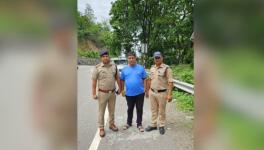RTI Activists, Whistleblowers not Safe When Judges are Targeted
Uttam Anand, the district and sessions Judge of Dhanbad, was killed under mysterious circumstances on July 28. CCTV footage showed the Judge jogging on one side of a fairly wide road when an autorickshaw veers towards him from behind, hits him and flees. Judge Anand was brought dead to the hospital. The killing triggered a furore.
Two years ago, Darvesh Yadav, the first woman chairperson of the Uttar Pradesh Bar Council, was shot dead on the Agra court premises just two days after her appointment.
More worrisome are the comments of the Supreme Court (SC) regarding the lackadaisical attitude of the police and the Central Bureau of Investigation (CBI). Taking cognisance of Judge Anand’s killing, a two-Judge Bench headed by Chief Justice of India (CJI) NV Ramana, told Attorney General KK Venugopal that the police and CBI do not respond when Judges file complaints.
If this is the condition of the powerful and privileged, then Right to Information (RTI) activists, whistleblowers and the common man are at greater risk.
The Bar Council of India has already moved the SC for the formation of a specialised security force under the control of the judiciary to provide protection to Judges and guard court premises instead of relying on the police. However, it is a myopic view of the problem considering all citizens are equal under the Constitution with each human life equally valuable.
Root cause is corruption
The root cause of the problem is corruption since several high-profile cases involve the rich and powerful. Any adverse verdict not only affects them but the entire chain supporting their operations. Anyone coming in their way—activists/whistleblowers/complainants who expose or file cases against them, witnesses who can’t be bought and Judges who refuse to get compromised—is either intimidated, hurt or even killed.
Corruption destroys the very fabric of society. Therefore, the first step in the fight corruption is the realisation that the scourge affects each one of us, directly or indirectly, like passive smoking. Ignoring corruption of any kind is simply not a choice if we want a lawful, peaceful and well-governed society.
Therefore, the focus should be not only on providing security but on building a system that will substantially reduce corruption, if not eliminating it, increasing accountability and ensuring that the rule of law is applied in every case.
The first port of call should be the police, but its track record does not inspire confidence. Last week, CJI Ramana commented on the disturbing trend of the police taking the side of the ruling party while hearing the case of a former inspector general of police of Rampur, Durg and Bilaspur. During another hearing, CJI Ramana observed that the threat to human rights is highest in the police stations.
In March, former Mumbai police commissioner Param Bir Singh accused then-state home minister Anil Deshmukh of running an extortion racket. A DGP in Punjab has been accused of amassing wealth disproportionate to his known sources of income.
In blatant contempt of eight-year-old (12.11.2013) judgement of a five-Judge Constitution Bench of the SC in Lalita Kumari vs Govt. of U.P. & Ors., which made registering of an FIR mandatory once a cognisable offence is made out under Section 154 of the Code of Criminal Procedure, FIRs are not filed for several years when the cases involve the rich and powerful. Instead, complainants are harassed and intimidated to withdraw their complaints.
Role of Civil Society
To fill the yawning gap in the official machinery, the role of civil society, RTI activists and whistleblowers in fighting corruption becomes all the more relevant. The progress so far has, however, been slow. They make the initial expose in the hope that the judiciary will take their efforts to a logical conclusion. Sadly, the system often fails them. Scores of RTI activists and whistleblowers have been killed over the last several years despite the enactment of Whistle Blowers Protection Act in 2014.
The way out
A number of RTI activists and whistleblowers have been doing a great job in different parts of the country. Many more who can contribute significantly to rooting out corruption are dissuaded either by lack of protection or the threat of a backlash. Besides, several of them lose steam during the process due to the slow official response to their queries or revelations.
Coordinated action on a national level by pooling legal expertise, research and financial support with prioritisastion of few cases to take them to their logical conclusion will make a difference. This, in turn, will inspire confidence and motivate others to come forward. The key lies in numbers, perseverance, drive and hunger for success. If we could drive the British out of India, there is no reason why we cannot root out corruption.
Sarvesh Mathur is a senior financial professional and has worked as CFO of Tata Telecom Ltd and PricewaterhouseCoopers in the past. The views expressed here are personal.
Get the latest reports & analysis with people's perspective on Protests, movements & deep analytical videos, discussions of the current affairs in your Telegram app. Subscribe to NewsClick's Telegram channel & get Real-Time updates on stories, as they get published on our website.
























